The Checker Maven
Jump to navigationOnce Again to Knighton
A Short Story

The draughts championship of Wales was coming up in less than a month, to be played, as always, at the Bowling Club in Knighton; and he wanted very much to play there one more time. Indeed, he had played there many a year, and often taking home the trophy, too; and though he had missed the last year or two, he wished to go back, for he knew that he would not have many more opportunities.

He wanted to see his old friends, and gather with them in the Horse and Jockey for drinks and chats in the evening after the games were over. He wanted to stay at Mrs. Bythell’s lovely rooming house, and have her fuss over him as she did with all the draughtsmen, pouring their tea and buttering their scones and wishing each of them luck— as if they all of them at once could win the title!
He wished to walk the narrow alleys and peer in the quaint shops, and see the clock tower and enjoy watching the sun emerge after the inevitable Knighton rain showers. He wanted one more reprise of all those delicious sensations that he had come to associate with the annual competition. But this year, he didn’t know how, or if, it could come to be.
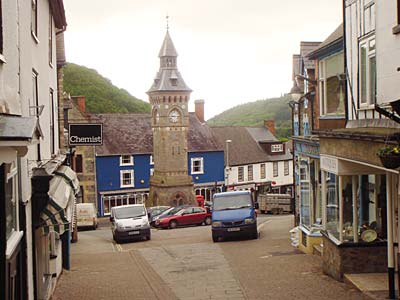
His health, never robust in the first instance, had declined this year, and some said markedly so, although they thought they whispered it softly so he would not hear. But the expressions on their faces and their quick glances in his direction conveyed the message as clearly as words could have done. Yes, he was not doing as well as he once had nor as well as they, or he, would have wished. Yet still, he wished to go to Knighton.
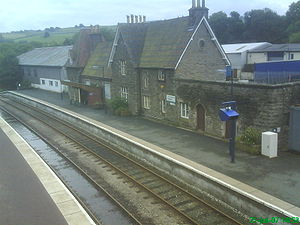
“Five hours on the train, how ever will you stand it!” his wife would exclaim, for even he would admit that it was inadvisable if not downright unsafe for him to attempt to drive. “And the dampness, and the strain! You’ll catch your death, or worse!” she would say, and he would try to imagine her ideas of what might be worse.
His doctor, of course, stood with his wife. “But Mr. Edwins,” he would insist, “as your medical adviser I simply cannot condone such exertion and exposure to the elements, not to mention the risks of infection on public conveyances ...”
It went on and on. When he became stubborn about the idea, he would get sudden calls from his children, at first merely urging him to take care, and then in later calls insisting outright that he not be foolish and strong-headed.
Today, at least, he would have a bit of diversion. His old friend John had made the long trip down from Manchester to pay him a visit, share a beer and conversation, and enjoy a friendly game or two at draughts after enjoying one of his wife’s fine dinners. John, too, was getting older, and couldn’t visit as often as either of them might have liked; but he was grateful and happy to see him, even though the occasions were not frequent.
John had arrived just a bit after one in the afternoon, a little tired out from almost three hours of driving. But the first glass of beer, served in the parlour, soon revived him, and the two men talked at length about a number of topics, although to no one’s surprise the discussion always returned to draughts and draughtsmen. Naturally enough, after a while they began to talk about next month’s tournament in Knighton. And so, he decided to make his plea to John.

“I haven’t played there the last few times, and I’m thinking of going this year,” he said, attempting nonchalance.
John gave him a look that was at once quizzical and knowing. “I’m guessing that your idea isn’t so well received on the home front,” he said quietly, eying the light reflected from his beer glass through the parlour window. He leaned forward a bit on his seat. “You know, Linton, it might not be the best idea, all things considered. It’s a long enough trip and playing several games a day ... well ... your blood pressure and all that ... ”
“There’s many a time I’ve won, you know, and not just in my earlier years,” he interrupted, clearly ignoring the substance of John's remarks, “and I think I’ve still got it in me to play again ... I don’t have to win, you know, just play ... ” His chair creaked as he straightened his back for emphasis. “I’m certain I could do it ... ”
“Indeed, won you have, and more than once,” said John, “and I know you take well-earned pride in that. You don’t need to prove anything to anyone ... you were the best ... everyone knows.”
Yes, he thought, that’s how they know me. I was the best, in the day. But today ... well, old Linton just isn’t up to it any more, pity, but in any case the younger players are coming on strong and time marches on ...
A has-been; a very fine has-been, but a has-been none the less. That’s what they all think.

But of course, he said none of it, just kept his own council, though John surely saw his expression, the hurt and sadness in his eyes, yet John, too, remained silent. They both sipped at their beer, saying little more, until they were called in for dinner.
When John visited, his wife went all-out to put on an excellent meal. This time was no exception, and from the minute he and John tasted the soup, the mood began to lighten and the old conviviality returned. His wife, easily guessing what the matter had been, simply smiled, not feeling the need to do or say more than that.
They all talked of the weather and football and taxes, the state of the world, and all those things that people talk about at dinners among friends. Shadows began to grow longer, and she served them coffee, knowing that they wished to play a few games before John began the drive home; John didn’t like to be out that late these days, and normally would be off before nine o’clock. Even at that, he wouldn’t be home much before midnight.
So the table was cleared of dinner dishes and replaced with a pot of coffee, cups, and the draughts board.
John and he played informally; they’d play some go-as-you-please, and they’d try the odd three-move ballot, often to experiment with interesting lines of play. Little was at stake, after all; and they would say in jest that “the loser pours the coffee.”
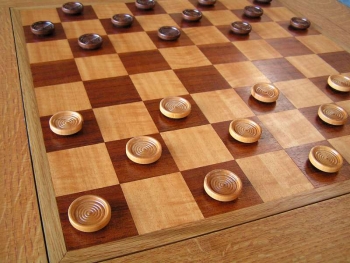
Was it the appearance of the draughts board on the table that turned his thoughts back to Knighton, or was that just an inevitability once dinner was done and his wife had retired to her sitting room?
"John, let's play a serious game," he began, "you know, just for a little practice, before you play at Knighton.
It wasn't hard for John to grasp the real intent. "Linton," he said, "you really should let it go ..."
"Just one game with the clock! It's for you, after all!" he said, knowing full well that it wasn't. "After all, you won't be able to get in a lot of practice ..."
"All right, then, we can play a game with the clock, but you must promise me that you won't then continue to pursue this idea of yours any further, what with your medical advice and so on."
He didn't reply; after all, he was an honorable man and even in small things didn't wish to give his word without meaning in his heart to keep it. So he just got the clock out of an end-table drawer and set it up next to the checker board.

"Sixty minutes a side," he said quietly, knowing full well that this was the time limit used in the tournament.
"Sixty minutes!" John exclaimed. "Why, it will be nigh on time for me to drive home before we're finished, and we'll only have played one game! And besides, it will tire you so and you shouldn't ..."
"No worries, John. You'll enjoy a good game and I can go to bed soon after we're done." Not waiting for an explicit agreement, he set the clock and made his first move. John just shook his head slightly and said no more.
And so they played, John fretting a bit more than usual over his moves, he sipping at his coffee. After a little while, his wife came in to see if they needed anything. Upon seeing the clock and the serious looks on their faces, she said, "Why, whatever is the matter here? I've never seen the two of you with such long looks!"
John shrugged his shoulders, ever so slightly, looking a bit sheepish. "I think Linton's just trying to show me something," he said at last, and, seeing that she looked neither convinced nor satisfied, added, "but he promised me ..."
He sat up quickly, breaking his concentration. Had he become a little angry? "I didn't!" he said with a force that was hardly customary. "I did not make any promises! I only said I would like to play a good, serious game, and for your benefit at that!"
"Yes," John replied, "for my benefit, if you wish. But still, I thought it was a condition that you drop the idea of going to Knighton."
"Well, I never agreed to that!" he said, and there was a catch in his voice as he continued. "All of you ... you're denying me something that you know I want ... it's not right! And I know I'm up to it! You're just ... just ..." but he could not go on. There was a tear in the corner of his left eye and he brushed at it, trying to hide his reaction. But his wife knew him too well.
"There, dear, I'll freshen the coffee and you just play the rest of your game, so Mr. John can drive home to Manchester," she said, and bustled quickly off into the kitchen, as much to avoid further embarrassment as anything else.
And so the game went on. Nearly fifty minutes passed by, with both of them once again completely absorbed in the contest. Soon the game reached a critical point. But the hour was advancing, and John started stealing occasional quick glances at his watch. "Don't you think you should ..." John began, but it was clear that Linton, lost in concentration, was not going to reply.
The position on the board was this:
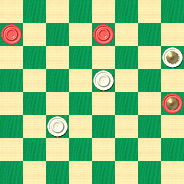
WHITE
White to Play and Win
W:WK12,15,22:B5,7,K20.
It was his turn to play. The patterns of the checker pieces evolved in his mind's eye, and his thoughts swirled with them, thoughts and pieces mingling, intertwining, red and white becoming one. Memories flooded in, combining with men and squares, forming intricate patterns, turning about in a cacophony of color. Until ...

He was twenty years younger and he was playing in for the second or third time in Knighton. Light streamed in from the window next to his table; he could hear the ticking of the clocks in the busy hall, and he was alert, and feeling strong and confident. A few spectators walked about the room, whispering comments about the games to each other and nodding sagely. But he didn't notice. It was the next to last round and a victory would give him a clear chance at his first title.
The game had been long and hard. He had arrived for the second round of the day early in the afternoon after a nice light lunch at Mrs. Bythell's rooming house, and visited for a little while with the other players. "Eh, lad," one of his older friends said, "quite a run of luck you're having this year!" But of course both of them knew it wasn't merely the results of good fortune that had lead to his standing near the top of the chart. And then it was time for him to find his assigned table, greet his next opponent, exchange good-luck wishes, and begin the contest.
So, after more than an hour, all was going well. He briefly regarded his opponent and saw the signs. His opponent was surely thinking that the game might soon end in a draw. He had no idea that Linton was calculating a combination of moves that could spell victory after a long afternoon of gentlemanly combat. Linton was not to be put off. A bit more concentration, visualizing the results of this move, followed by that move ... and there it was. He saw the path, and he would take it ... he reached out his arm ...

A clatter and a crash brought him back to the present day, and he realized with shock that he had dropped his coffee cup onto the floor, where it had shattered into pieces, a brown liquid stain spreading across the carpet. "Are you all right?" John exclaimed in surprise, as Linton's wife came running from the sitting room, her face quickly turning pale, and then just as rapidly growing red.
"What on this earth ..." was all she could say, and then hurried to the kitchen to fetch towels, her dish-washing gloves, and a wastebasket. Giving her husband a rather severe look, she began to clear up the mess. "My carpet!" she said, "I'll need to have it cleaned now!"
"I'm terribly sorry," he said, directing his words to John as much as to her. "This game ... it was so very like one I played in Knighton one time ... and for a moment ..."
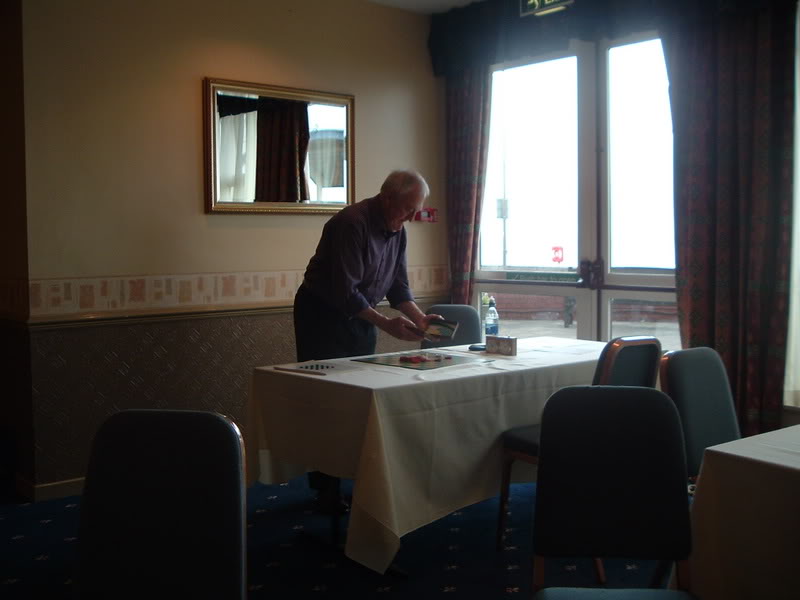
"Oh, enough about Knighton!" his wife cried in frustration. "Your foolishness will be the end of both of us!" John, clearly a bit embarrassed, said quietly, "Perhaps I should be off and driving now ... in any event, our game has been long and has surely become a draw."
"No, no!" Linton replied, "not just yet! Here, here, look at this!"
And so saying, he made a few moves on the draughts board.
John looked down, and then froze where he stood. His mouth open, he sat in his chair and simply stared at the board. Then he shook his head and said in a rather quiet voice, "Why ... that's ... brilliant! Who ever could have seen … "
"Oh, brilliant indeed," Linton's wife began, but John waved his arm as if asking for silence. Then, realizing what he had done, he said in an apologetic tone, "I don't mean to be rude, Mrs. Edwins, really I don't, but this is just astounding. Most amazingly, your husband has produced victory in a position that I took for a certain draw!"
Mrs. Edwins did not seem terribly impressed by this as she finished picking up the broken pieces of china and blotted up the rest of the coffee from the carpet. The two men went over the final moves once again, and there was no doubt as to the outcome. Linton had won.
John was smiling and shaking his head at the same time. "Truly amazing, it is!" he said. "Whoever would have thought ..."
His expression changed. "I hardly can believe what I'm about to say," he stated, "but, Mrs. Edwins, I think we really must let Mr. Edwins go to the tournament at Knighton. I knew that your husband is a fine draughtsman, but I had no idea ... his skills have grown, not decreased ... it would be a shame for him, indeed, a loss for all of us, if he were not to take one more turn at vying for the championship."
"But ... but Mr. John, his doctor says ... and you saw what just happened, he's so unsteady ... and you yourself were just saying ..."
Linton, seeing a chance, wisely enough did not speak as the dialog spun its way out.
"I think ... I think he was only lost in thought," John said, and was that a wink that he directed at Linton? "And besides, if we all looked after him ... I know, yes, I was opposed to the idea perhaps as much as you are, but look at this!" and he pointed meaningfully toward the draughts board. "Anyone who can produce play like this ... !"
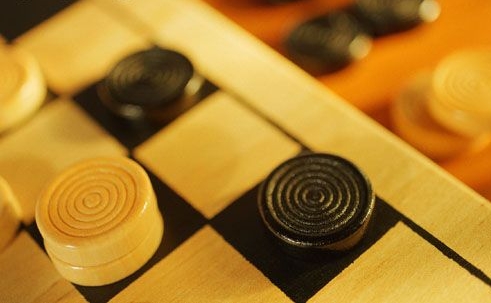
"Well, I'm surely no draughtsman," she replied, "and whatever you're showing me, I can't fathom the meaning." She paused for a moment. "Do you really think he should ..."
Linton could keep it in no longer. "Yes, yes!" he said. "I can do it! Listen to John, please! I know I can play again!"
"Mrs. Edwins, I really must be driving home now," John said, "but I do surely hope you'll give it consideration. As much as it surprises me to do so, I'm adding my own plea to that of your husband. Please do allow him to play, just this one more time."
Was she beginning to soften? "Well, well, now, I suppose I should think on it overnight, then. But no promises, and you, Linton, don't get your hopes up too high only to be let down!"
John had put on his sweater and was headed toward the front door, Linton and his wife following behind. Thank-yous and good-byes were said as always, but Linton's thoughts were elsewhere. After so many decades together, he knew his wife well, and he knew what it meant when she was going to "think on it overnight."
He would be going to Knighton this year, and he only had to wait until morning for his wife to tell him so.![]()
For the solution to the diagrammed position, click on Read More.

Solution
22-17 5-9 17-13 9-14 13-9 14-18 9-5 18-22 5-1 22-25 1-5 25-30 5-9 30-26 9-6 7-10 12-16 20x18 6x31 White Wins.
Story Copyright (C) 2009 Avi Gobbler Productions, a division of Mr. Fred Investments. All rights reserved. No republication in any form, including but not limited to print, internet or electronic publication or any other manner of publication whatsoever, is permitted without the express written consent of the copyright holder.
Images are the properties of the respective owners and were taken, to the best of our knowledge, from material generally and widely available in the public domain.
Many thanks to Lindus Edwards for advice and counsel as well as some photographs taken in Knighton.
A typeset version of this story can be downloaded in PDF format here.
You can email the Webmaster with comments on this article.
